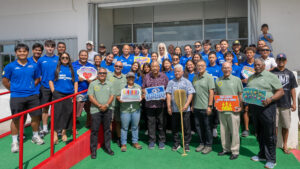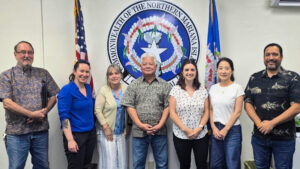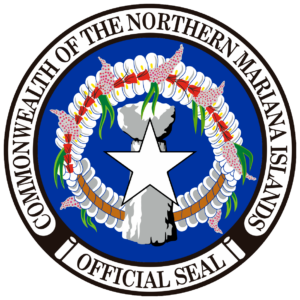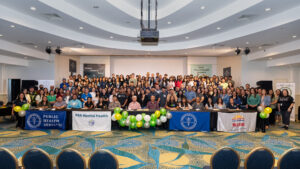Effective last Monday, March 23, 2020, pursuant to Governor Ralph DLG Torres’s Executive Order 2020-05, Directive #8, all individuals entering the CNMI have been ordered to quarantine at a designated site for 14 days. Incoming travelers will also be enrolled into the Text Illness Monitoring (T.I.M.) system, which alerts CHCC staff when enrollees report symptoms.
Why Quarantine?
Quarantine in a facility for 14 days is necessary because exposure to COVID-19 may not become apparent until 14 days after a person is infected. This is also known as the “incubation period” of the disease. Travelers coming into the CNMI from COVID-19 affected areas, such as Guam, Hawaii, Korea, China, Japan, and the Philippines, may have been exposed to the disease. For the protection of the public, these individuals which may have been exposed are quarantined and closely monitored for the full incubation period to prevent the spread of the disease.
What about Health Clearance?
Individuals who present a health certificate certifying that they tested negative for COVID-19 in the previous 72 hours may be considered for exemption from quarantine, but this certificate must be reviewed at the quarantine site. Only health certificates, issued by a recognized health agency, indicating that the individual was tested negative for COVID-19 will be honored. For example, travelers from Guam must present a health certificate indicating a negative test for COVID-19 issued by the Guam Department of Public Health and Social Services within 72 hours of travel. A health certificate alone does not guarantee exemption. All individuals, even those requesting exemption, must go to the quarantine site after arriving in Saipan.
What is Quarantine?
Quarantine is when the movement of an individual, or a group of individuals, is limited after possible exposure to a communicable disease, for a time period equal to the longest incubation period of the disease. This is done to prevent transmission of a disease to others. In the case of COVID-19, this is especially important if an individual is coughing or sneezing. Tiny droplets of fluid from a cough or sneeze can land on surfaces touched by others, and get into healthy people’s eyes, nose, and mouth which make them sick.
I’m scheduled to fly into Saipan soon. What should I expect?
All incoming travelers and their luggage will be escorted by staff of the Commonwealth Office of Transportation Authority (COTA), the CNMI Office of Homeland Security & Emergency Management (CNMI HSEM), Department of Fire and Emergency Management Systems (DFEMS), Department of Cultural and Community Affairs (DCCA), Department of Public Safety (DPS), Department of Finance-Division of Customs, and Commerce-Alcoholic Beverage and Tobacco Control directly from the airport to a local hotel serving as the designated quarantine facility. All customs processes and health screening will take place on site at the quarantine facility. Any health certificates held by travelers will be reviewed, and any symptoms checked and documented by medical personnel on site. From there, persons under orders to quarantine will be checked into the hotel and given details on their stay. Because the purpose of strict quarantine is to reduce the risk of disease transmission, people under orders to quarantine cannot see family or friends in person during their quarantine, however each room is equipped with internet and telephone service, and people under orders to quarantine are encouraged to communicate with family and friends often. Interaction with loved ones is protective of physical and mental health.
Meals will be provided to all those under orders to quarantine, and any special dietary needs or allergies should be communicated at check-in.
Friends and family members may drop off items at the quarantine facility during hours designated by the CNMI Homeland Security. Incoming travelers are strongly discouraged from travelling with any items that require refrigeration.
I am a healthcare worker; do I have to be quarantined?
All new and returning healthcare workers (HCW) will be assessed according to the CHCC Healthcare Worker COVID-19 Screening Protocol. This protocol is initiated at the quarantine facility. Due to the severity of COVID-19, CHCC needs all HCWs to be available for the community. Coupled with our continuous shortage of health workers, CHCC, with consultation from regional experts, developed this protocol to allow for the medical clearance of HCWs. HCWs who present a certificate from a recognized health agency indicating a negative COVID-19 test in the last 72 hours of travel and are asymptomatic will be allowed by the CHCC medical team to exit the quarantine location. Asymptomatic HCWs without a valid certificate will be enrolled into a strict daily monitoring plan by the CHCC health team and also allowed to exit. Any symptomatic HCWs will be ordered into quarantine.
Are unaccompanied minors (under 18) exempt from quarantine?
Minors who travel unaccompanied will undergo quarantine at the designated site if they do not have a health certificate. One parent or legal guardian will be allowed to stay with the minor at the designated site.
Enforcement
Given the importance of protecting our small island community, CHCC will work with the Governor’s COVID-19 Task Force and local law enforcement to enforce penalties on noncompliance of the mandatory 14-day quarantine requirement for arriving travelers.
Violators of this important protective measure will receive a maximum of no more than a year imprisonment and/or no more than a $500 fine, as provided under law.
STAY AT HOME, STOP THE SPREAD
The Governor’s COVID-19 Task Force and CHCC would also like to remind the public that the best way to protect yourself and others from COVID-19 and other illnesses is to practice:
Social-distancing, which means avoiding close contact with people in order to avoid catching the virus yourself and to avoid passing it on.
● Please stay home as much as possible. Avoid unnecessary travel or exposure in public places.
● Work or do schoolwork from home whenever possible and reasonable.
● Avoid social gatherings in groups of more than 10.
● Avoid eating out at restaurants. Use drive-thru, take-out, or delivery options.
● Older adults and people with chronic medical conditions are at higher risk of getting very sick from this illness. People at high risk should stay at home as much as possible.
● Create a household plan of action https://www.cdc.gov/coronavirus/2019-ncov/prepare/checklist-household-ready.html
● Ensure 30-day supply of all medicines.
Continue good hand hygiene:
· Wash your hands for at least 20 second with soap and water, avoid touching your face, cover coughs and sneezes with a tissue or your sleeve.
Know the signs and symptoms of COVID-19 and what to do if you become symptomatic:
● Stay home when you are sick and if you recently traveled to a place with COVID-19. Self-quarantine looks like:
○ Choose a room in your house that can be used to separate sick household members from others.
○ Wash your hands often with soap and water for at least 20 seconds. If soap and water are not available, use an alcohol-based hand sanitizer.
○ Avoid touching your eyes, nose, and mouth with unwashed hands.
○ Limit visitors
The CHCC appreciates the patience and understanding of the community at this time. To obtain information about COVID-19, please reach out to the COVID-19 Infoline at the following numbers: 285-1542/1672/1352/1854 These numbers are available 7:30AM-7PM.
For mental health support and helpful tips during a crisis please call the Mental Health Care Line at 285-1856/1857 These numbers are available 7:30AM-7PM.
For more information about CHCC programs, please follow us on Facebook, Instagram, Twitter at @cnmichcc, check out our website at www.chcc.gov.mp or call us at (670) 234-8950.
This health advisory may be found online at http://www.chcc.gov.mp/pressrelease.html
CHCC Point of Contact:
Janet Guerrero / Portia Tomokane
(670) 234-8950 Ext. 3422, communications@chcc.gov.mp
Governor’s COVID-19 Task Force Point of Contact:
Kevin Bautista
kevin.bautista@gov.mp





